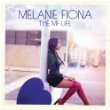“Melanie, you in danger, girl,” said in my best Whoopi voice. Canadian R&B singer Melanie Fiona is not in danger of not singing well. She generally kills on vocals. She’s not in danger of not being beautiful enough in this video age. She’s a very pretty if, conversely, nondescript woman. She’s not in danger of not enjoying some notoriety; she received a Juno Award this year for “Gone and Never Coming Back” and two Grammy wins for her contributions to Ceelo’s “Fool for You” (but not for the Grammy nominated “It Kills Me” off her project). No, none of these things menace Melanie Fiona. Rather, she is in danger of being indistinctive to the point of having to be re-introduced, as if brand new, with every single, every album, every video…there is something about Melanie that quite simply doesn’t stick after you’re done listening, seeing, experiencing... Unfortunately, her sophomore album, while a very solid effort, doesn’t cure all that ails Ms. Fiona.
The vaguely provocative title, The MF Life, doesn’t announce an artist in rebellion, nor does it tell you much about the artist herself. It is a series of calculated and episodically pleasing cuts meant not to diverge too far away from the proven formulas that gave Fiona at least two bonafide hits in “It Kills Me” and “Give It To Me Right” off of 2009’s The Bridge. The album sold roughly a respectable quarter of a million copies in the U.S.; not quite gold, but not bad in this “lowered expectations” sales environment. So, instead of pushing their artist further into becoming an original diva that fans can rally around, it seems Universal Republic is comfortable letting Fiona set somewhere between quasi-retro soul (“Bones,” “I Been That Girl” and “Can’t Say I Never Loved You”) and Whitney Houston torch singer (“Wrong Side of A Love Song” and “Gone and Never Coming Back”) with a few synthy Euro-pop anthems thrown in as bet hedgers (“4Am” and “This Time”). The saving grace in predictable cut after predictable cut is the strength and power of Melanie Fiona’s undeniable voice - but in tone, phrasing and approach it’s not a signature voice of great distinction. You don’t immediately know it when you hear it on the radio, which is a shame, because with a major label behind her, you should. The consistency and memorability of her image isn’t much better. Describe Melanie Fiona’s image, even easier, what she looks like. Go ahead, I dare you…still waiting…anytime now.
Maybe this project will change all that. There are a handful of amazing moments to be found. With an electric guitar opening reminiscent of The Temptations’ “Cloud 9” and equally cinematic lyricism, “Watch Me Work” thrills. The 2012 Juno Award-winning “Gone and Never Coming Back” is a piano ballad worth your attention. “Wrong Side of a Love Song” feels forced and polished to artifice, but Fiona’s voice is never less than sincere on the big notes, which the song luckily has in spades. The retro-soul meets hip hop duets between Fiona and John Legend (“L.O.V.E.”) and Nas (“Running”), respectively, work fairly well, each distinctive, catchy and bright in its own way. The Nas and Legend cuts certainly fare better than the more obvious radio collabos with B.o.B. (“Change The Record”) and T-Pain (“6 AM”), respectively. The weak J. Cole rap on “This Time” is spared similarly blistering comparisons by a rhythm track that’s a banger; you just wish Fiona had better company flowing over that bassline.
Then there are the not-so-amazing moments, and not just the fatiguing B.o.B and T-Pain duets. There are the songs that have lyrical potential like “Bones” and “I Been That Girl,” stories that get undercut by clichéd to non-existent productions that drain the songs of any originality found in their narratives. The electro-soul contrivance, “4AM,” didn’t work as a single when it was unleashed onto the world last summer, and it doesn’t work much better as an album cut. Acoustic guitar strumming “Can’t Say I Never Loved You” starts with enough sunshine appeal despite an ironically depressing lyric, but the cut stays flat, never quite achieving lift off. Sadly, the same can be said for half of this schizophrenic album.
Who is Melanie Fiona? Paling around with originals like The Roots and John Legend, is she the honest music movement’s answer to Whitney or even Lauryn (I know, hush my mouth, right?)? Is she a synth riding, Euro pop radio hottie ala Rihanna or Keri Hilson? Maybe she’s an artsy R&B chauntese coloring both in and outside of the lines like Solange and Elle Varner? Well, right about now her music is kind of a cross between a black Joss Stone (oh, the irony) and fellow Canadian artist Jully Black. Remember Jully Black? Yeah, neither do a lot of people. And, if Melanie Fiona doesn’t discover a sound and an image that defines and sticks really soon, we’ll be asking the same question that started this paragraph. Mildly recommended.
By L. Michael Gipson

